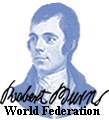|
Robert
Burns and Sir Walter Scott -
Two Versions of Scottish National Identity
Ingo Kuehn from Germany,
contacted us asking if we would publish his research paper entitled "Two
versions of Scottish National Identity: Robert Burns and Sir Walter Scott"
Having read this in-depth
paper, I responded by asking why he had written it. He replied saying
:-
"Why have
I compared Burns and Scott as far as their national identity is concerned?
"
"First,
I did it due to my state examination, but, most of all, I am a real admirer
of Robert Burns. Being a Social Democrat I appreciate his attitude towards
social injustice and being an anglophile and lover of poetry I like his
style of writing. Furthermore, I was living in Dumfries for almost a year
in 1996 (teaching German at two comprehensive schools) and I got to know
a lot of the Burns´ cult including a real Burns´ supper in
a private house with bagpipes, haggis etc.. Being fascinated by Rabbie´s
literature I was bound to write an academic essay on him. "
I am willing
to answer mails concerning the provocative analysis.
E -mail Ingo at -
ingo.kuehn@ruhr-uni-bochum.de
|
|
|
Introduction
Andrew Wilson, member of the 'Scottish National Party' suggested to the
Scottish people to support and to spur on the English football team at
the World Championship this year. He demanded to back the only remaining
British team for the Scottish team is not qualified. He received, however,
many replies including faxes and emails, which insulted him as a traitor
to the 'Scottish issue.1 Now queries for the 'Scottish issue' turn up:
what is the Scottish identity or is there any in the first place? Is there
a kind of 'Scottishness'? Has Britain and the idea of 'Britishness' really
existed? In Glue, which was written by the contemporary Scottish novelist
Irvine Welsh, the protagonist states that "Britain never really existed."
Is Britain itself really a construction made up in the mind and far away
from reality, and has the Union of England and Scotland in the sense of
a cultural coalition ever been fulfilled? Here these questions cannot
conclusively be answered, but it is worth scrutinizing some crucial events
in Scottish history and looking into the influential period from the middle
of the eighteenth century to the beginning of the nineteenth century.
This was the era of two famous Scottish writers: Robert Burns (1759- 1796)
and Sir Walter Scott (1771- 1832), and the leading topic for this research
paper is the attitude of these ambivalent characters towards the concepts
of 'Scottishness' and 'Britishness'. For this purpose it is necessary
to give an overview what British society in general and Scottish society
in particular looked like. All in all this study only represents an attempt
to understand Scotland better, and with the help of a differentiated comparison
of Robert Burns with Sir Walter Scott the differences and similarities
as far as their attitude to Scotland and Great Britain is concerned are
pointed out. The approach of this project is based on the following consideration:
for structural and chronological reasons we will
examine the so-called 'Jacobite cause' and the novel Waverley, which was
written by Scott, first. Furthermore, the importance of the 'Jacobites'
in Scott´s work made me choose a single and separate chapter because
his achievements for and his contributions to a Scottish national identity
are especially substantial and large. In the first chapter the political
development- particularly the emergence of 'Britishness'- is focused,
whereas the social perspective is in the centre of the second chapter.
Robert Burns´ precise description- reflected by his poetry- of the
social situation and development in Scotland is mentioned for he was more
interested in showing social injustice and the democratic movement than
anything else. This social perspective on 'class distinction' stands for
a divergent approach to the definition of the Scottish national identity,
and, therefore, a chapter of its own is justified. The last and third
chapter is considered to be an innovative comparison of both writers on
several issues in order to portray their personal attitude to Scotland.
Eventually, the analysis of the political and social perspective may lead
to the judgement that there have been- as the title suggests- two different
versions of Scottish national identity. After the process of juxtaposing
both Burns and Scott on various aspects of Scottish history and after
numerous efforts to describe and define 'their version' of a Scottish
national identity, the observations and judgements are finally summarised
and concluded. Before the examination begins the reader will allow me
a final remark: we have to consider that there are many books on Burns
and Scott, but almost no historian nor literature specialist has systematically
paid attention to the their standpoint on Scotland in specific and compared
them as far as their definition of 'Scottishness' is concerned, i.e. what
their native country meant to them. The following analysis is a modest
and unassuming attempt to fill this gap.
Page
2
The
'Jacobite cause' and Scott´s Waverley- Consequences for the Scottish
identity? |





